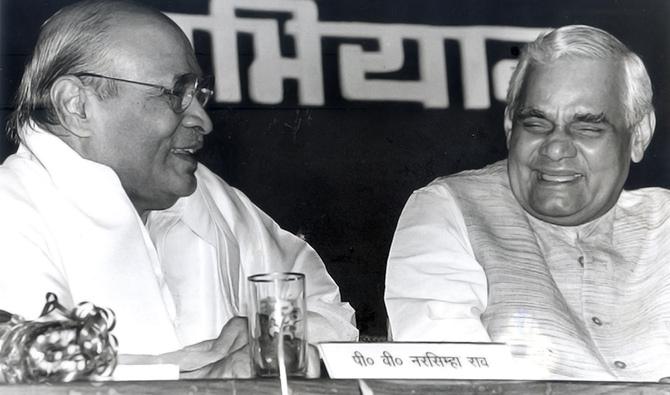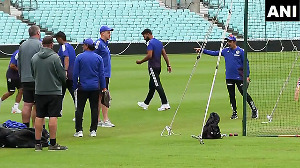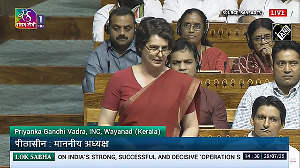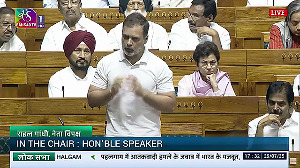It's time India re-visited its Western alliances for the attitude and approach that the West reserves for the nation when it comes to security cooperation of the kind that they might not have visualised outside of China, India's bug-bear, asserts N Sathiya Moorthy.

From the days of Mahatma Gandhi, the freedom movement and their over-hanging imagery on India's domestic politics and international relations, the world has always taken a benign view of the nation -- whoever has ruled from New Delhi.
The height of it all was Indira Gandhi effectively converting the Bangladesh War into an unavoidable fight for 'moral right', drawing a near-parallel to the karma yudh in the Mahabharat without referring to either.
The Indian street picture of the (evil) West aligning with the historic wrong-doer, Pakistan, when Bengalis in then East Pakistan were only seeking their own physical, political and diplomatic space, as in the epic, provided the much-needed moral backing for the government of the day that New Delhi felt convinced even more of its aims and goals -- that it fought and won the war in 16 days -- as against 18 in the Mahabharat.
It is this moral fibre that the world identified with it -- even when the Western colonial masters, starting with the neo-colonialist in the US -- that convinced them not to suspect India's nuclear intentions even when powerful nations among them condemned New Delhi for Pokhran I & II, and also imposed economic and technological sanctions.
Why, every time a Western nation or scholar wanted to chide India on the twin nuclear tests or alleged human rights violations, there was an underlying reference -- at times expressed in the open -- about how the nation was violating the Mahatma's code.
Fast-forward to circa 2024. The US, the world's sole superpower still in the post-Cold War era, and its neighbour and ally in Canada, have separately accused Indian government agencies and agents of either killing a dissident holding their respective citizenship, or plotting to do so.
Both are high crimes in the two countries, especially the US, where 'securing the life and limbs of every American citizen' in the name of 'supreme national self-interest' is as much a political slogan as it is a tactical weapon, to be deployed against nations at convenient times.
There is no universality and impartiality to such application.
The problem with 21st century India, especially as it progresses with each passing year, is that the nation has not grown as much as it should for muscle-flexing at global players more powerful than us but the sense of such growth is all-pervading, mainly because of the politico-ideological uptake, fuelled by the incumbent government.
Hence, the current developments may have silently triggered a crisis of conscience attaching to the nation's inherent moral fibre, which is being questioned openly, challenged silently -- and by a West that had neither in the real sense of the term, other than as a political weapon.
The predecessor Manmohan Singh government or the Vajpayee dispensation before it was no less muscle-flexing, so to say, but they were not as vocal as the incumbent BJP-NDA regime of Prime Minister Narendra D Modi, over the past 10 years.
That's the tactical difference that made them grow without anyone noticing such growth and progress, which gives a certain political muscle for future governments to flex at a time of their choice.
Is the Modi government the chosen candidate for the same? The answer was/is and will be a firm 'No'.
A nation that is not ready to manufacture pin-to-aeroplanes in numbers and without an external component cannot afford to do so.
We are not yet there, but the way the likes of External Affairs Minister S Jaishankar went about it all in the months after the commencement of the Ukraine War two years ago, made individual Indians, especially the over-enthusiastic NRIs, feel elated that 'we are there at the high table', when we were not even in the room, might have been a contributory factor.

Indians may not like the parallel, but there was a lesson for us in the way China went about it since the advent of Mao Xedong's Communist regime in 1949.
They kept it to themselves, and paid for it, yes -- as the West made us believe.
Hence, when they made Indians believe that everything wrong with post-Independence India owed to the Nehruvian socialist model, most, if not all, believed it, or wanted to believe it.
So, the transition to the Western capitalist model, later with a 'human face' became acceptable to the BJP rival as to the Congress author of both the original and amended version.
Today, the Modi government at the Centre, and all state governments cutting across party ideologies of whatever kind follow the slogan in form and content.
It has shown results, but not enough for India to strike on its own.
It is here we should have learnt from Deng Xiaoping's China's economic reforms from the late 1970s.
They waited for the rest of the world, especially the West with its money and technology, to commit itself to investments and inter-dependence on China.
So, when incumbent Xi Jinping became president, only then did China felt comfortable at muscle-flexing.
Go back to old newspaper headlines, and you will recall how China prepared for this day, by enticing Western capital and 'stealing' Western technology, if it helped, again, to manufacture pin-to-aeroplanes in numbers that upset the global trade equilibrium, as none before it.
In a way, it's this that was the first of China's weapons, for use against the West that had got comfortable with their status quoist life of comfort in their inherited post-War fiscal and economic luxury.

Are we now as a nation where China was when Xi arrived, in terms of economic and technological superiority, compared to the India, then and since?
If we are convinced we are so already, we have nothing to fear of any other nation.
If not, maybe it was not appropriate with the leadership to have taken pot shots at so-called friendly and otherwise adversarial nations at regular intervals, and withdraw when it's time to defend our actions, whatever they be.
The parallel may sound too big and even out-of-place when compared to the US taking out Osama bin Laden in Pakistan without the knowledge of the Islamabad-Rawalpindi duo running the affairs in our neighbour, but for India and Indians, the life, limb and property of every Indian is as important as every American life is to the US of A, and every Canadian life, including those of identified Khalistani terrorists is to Prime Minister Justin Trudeau.
If parallels have to be drawn, you have the US, mourning and vowing on American deaths in the 26/11 Mumbai serial blasts and then going on to protect two American citizens, without handing over them to India, to stand trial in local courts.
The US system did it through a well-orchestrated and even better choreographed 'plea-bargain' drama that ensured that the two America-acknowledged terrorists would not have to stand trial for the substantive criminal charges against him in Indian courts, where alone it mattered.
All this is thus fair in love, war, including the war on terrorism.

Time was when in the early years of economic reforms, Prime Minister P V Narasimha Rao was circumspect enough not to upset the economic apple cart, too fast, too early, and decided not to proceed with the Pokhran-II nuclear weapons test when our nuclear czars were ready and confident to do it.
He had the wisdom to put it off to another day, another PM or another generation until India had developed whatever muscle needed to flex to a much lower-level than is being done at present.
PVN had evaluated the economic cost of a US-led Western sanctions regime if India tested.
Vajpayee, in whose time Pokhran-II happened, undertook an economic cost evaluation, and willingly opened up a line of communication with the US and the rest of the West, but from a position of relative strength.
The question is if successor regimes did their due diligence at every stage before embarking on an all-out political attack on the West, especially in the post-Ukraine War context and era, or were they self-deluding themselves that they have arrived, and hence India, too, has arrived?
In terms of Pokhran-II, Vajpayee as PM got the opportunity and praise -- some of his Sangh Parivar propagandists going as far as to belittle and ridicule PVN and his Congress party as born without a spine.
Vajpayee himself did not say anything close to it even though he also did not defend a predecessor, whose intelligence and intellect he trusted and respected.
But the very same Narasimha Rao, while being accosted by the US envoy that they had evidence of India meddling in Pakistan, had only this to ask of his spy team: 'Is there any truth in it?'
According to reports, pat came the reply: 'What do you want to hear, Sir?'
Know what PVN's reported reaction was: 'This meeting did not take place.'
He reportedly dismissed that crucial meeting in all of ten minutes or less.
Yes, it's time India re-visited its Western alliances, whether bilateral or multilateral of the Quad, Indo-Pacific kind, for the attitude and approach that the West reserves for the nation when it comes to security cooperation of the kind that they might not have visualised outside of China, India's bug-bear.
In doing so, if New Delhi wants to go head-on, so be it.
After all, a nation of pacifist-nationalists knows how to do without Western assistance and cooperation, at all levels, including possibly external security, vis a vis China, plus or minus Pakistan.
N Sathiya Moorthy, veteran journalist and author, is a Chennai-based policy analyst and political commentator.
Feature Presentation: Aslam Hunani/Rediff.com










